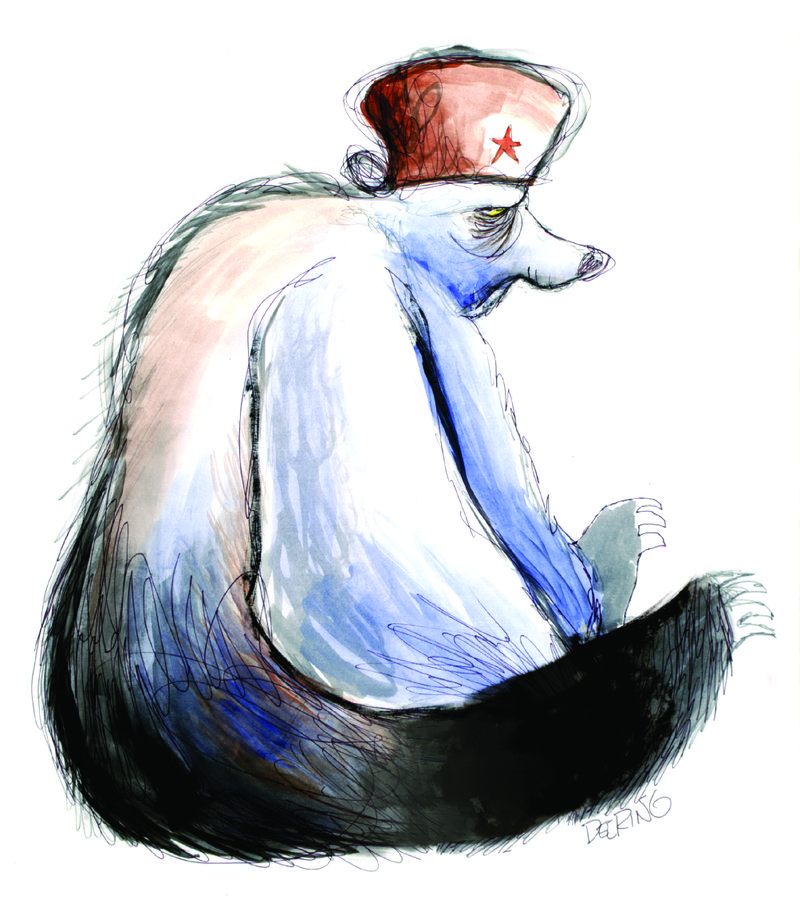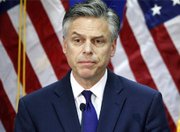When Jon Huntsman was serving as the U.S. ambassador in Beijing during President Barack Obama's first term, he observed his counterpart in Washington with envy. Cui Tiankai got meetings with the American political elite, from Hillary Clinton to Henry Kissinger, even before the Chinese emissary assumed his official post.
Huntsman found mostly closed doors. The Chinese, he recalled in a recent interview, typically assigned American ambassadors to a specific level in government, and breaking out of that was all but impossible.
Fast forward to 2017. Huntsman surprised many--from Never-Trumpers to Russia analysts--by becoming President Donald Trump's man in Moscow. And one of his first moves was to demand that whatever level of meetings Russian Ambassador Anatoly Antonov gets in Washington, he should get the same in Moscow.
"I didn't want to replay that" experience in China, Huntsman said. "So I made it clear when I started this job that wherever the Russian ambassador [had access], then I had similar access, and where I get access, Ambassador Anatoly Antonov should get access."
The statement may sound ironic given that a large segment of Washington, D.C. is trying to avoid meeting with Russian officials these days, or denying having met them in the past. Moreover, it's not clear that Antonov is actually getting that much access in Washington; he's reportedly been disappointed by a cold congressional reception.
The challenge of Huntsman's job is meeting with Russians, as many of them and as high-level as possible, and he says he's been successful.
"I've been able to access people who no ambassador in recent years has been able to access, in the military side, on the intelligence side, and mostly, on the national security issues where we're deeply involved and in joint efforts, where we need to meet, where we need to carry messages, where it's critical to get the work done," he told Foreign Policy in his first interview with Western press since arriving in Moscow.
The question for Huntsman, however, is not how to elevate the U.S.-Russian relationship to new heights. Rather, what is the role of the U.S. ambassador to Russia at a near historical post-Cold War low in bilateral relations?
Moscow and Washington remain at odds over everything from Syria to North Korea, not to mention a simmering war in Ukraine. Russian President Vladimir Putin, stealing a scene from Dr. Strangelove, threatened the West with an "invincible" intercontinental cruise missile. There are U.S. sanctions on Russia for its annexation of Crimea, additional measures for election meddling in the 2016 presidential election, and assurance from Treasury Secretary Steven Mnuchin that more penalties are coming soon.
The way forward is uncertain, but Huntsman makes clear what he will not be doing.
"In the years past, every new administration has tried to reset or redo of some sort, and let's not repeat the cycles of the past, because in every case, the reality was such that those resets could not be sustained," he said. "Let's not even begin with that thought in mind; no resets, no redos. Just take the relationship for what it is, clear-eyed and realistically."
Unlike his immediate predecessors in Moscow, Huntsman is neither a career diplomat nor a Russia and Eurasia specialist. A former Utah governor, Huntsman comes from a high-profile family whose success was built on his father's business dynasty. The recently deceased Jon Huntsman Sr. founded the Huntsman Container Corp., which made the plastic used in McDonald's clamshell burger containers, and later the Huntsman Corp., an $8 billion chemical-producing company.
While he's best known for his brief spotlight on the national political stage as part of a failed presidential bid in 2012, he's also served as ambassador to Singapore under President George W. Bush and ambassador to China under President Obama. In China, he benefited from unique regional expertise. A Mormon, Huntsman had done missionary work in Taiwan and speaks some Mandarin. With his language skills, he could as ambassador stop and haggle with food vendors and passersby.
Huntsman's only prior experience with Russia or Eastern Europe was traveling to the Soviet Union on business in the 1990s. That his international background is in China, not Russia, comes through when he attempts to speak Russian, which he says he does with a Chinese accent.
The only American ambassador to have served in both Russia and China, Huntsman says his time in Beijing helped prepare him for Moscow. He points to both countries' distinct diplomatic red lines, limited access to government, and centralized autocratic political systems. Instead of looking for a reset opening, he said the "trick is to find natural openings in these cycles of politics and activity that allow you a little breathing space to build trust, and expand a level of confidence beyond zero."
Nevertheless, he has managed to observe Russia's red lines. "Under the circumstances, and given that he doesn't have a Russia background nor a professional foreign service background, I think he's handling a hard situation pretty well," said Matthew Rojansky of the Kennan Institute. "He's not stepped in it in any obvious contexts. He's managed to avoid any bad mistakes in early days."
Not all previous ambassadors, including those with extensive Russia experience, have been able to navigate the political scene deftly. Michael McFaul, who served as Obama's ambassador to Russia from 2012 to 2014 and is now back at Stanford University, arrived amid protests against electoral fraud and met with opposition leaders on his second day in the job, a move that was seized on by Kremlin-friendly press outlets as proof the United States was meddling in Russian politics.
David Kramer, a former senior State Department official, told Foreign Policy that standing up for U.S. interests can be just as important as avoiding the perception of attempted regime change. "I do think the ambassador should meet with a whole range of people, including people in the opposition," said Kramer, now a senior fellow at Florida International University.
By contrast, Huntsman quickly earned respect in Moscow by working to establish contacts with heavy hitters in the Kremlin, says Dmitri Trenin of the Carnegie Moscow Center, though he did not specify who. Trenin says when Huntsman gets through to them, he tables talks on democracy and values (messages that typically fall flat in Moscow) and focuses on areas where Moscow and Washington can find common ground: counterterrorism, North Korea, drug trafficking. "They see him as a serious ambassador, as a serious man," Trenin said. "Moscow is not a place for weaklings, it's not a place for idealists."
Huntsman acknowledges this strategy. "Where [Russia] has a national interest, they will engage. And you have to be smart enough to identify areas where we both have overlapping interests," he said. "Where we have interests and they don't, they're just not going to waste their time. And neither should we."
In a nod to Russians outside government, he's given interviews to Russian-language media outlets, laid flowers to gulag victims and at World War II memorials, and replied in video form over soft jazz to questions that members of the Russian public can send in to the embassy via Twitter.
In late January just days after Putin had done the same, Huntsman plunged, shirtless, into icy cold water as part the Orthodox tradition for Epiphany, the holiday marking the baptism of Jesus in the Jordan River.
But Huntsman faces some unique challenges. It has, as one former senior U.S. diplomat noted, gotten more difficult to communicate with a wide Russian audience given the tight state control on what's broadcast on television. It's also harder, even for the ambassador, to travel around Russia (in December 2017, Huntsman canceled a trip to Vladivostok and Sakhalin Island after local officials declined to meet with him). And after a diplomatic tit-for-tat last summer, the U.S. Embassy in Moscow cut hundreds of staff.
In the end, however, Huntsman's political tightrope may be more about Washington than Moscow. Russian electoral interference is a sensitive subject for President Trump, and even acknowledging it can incur the president's wrath, as Attorney General Jeff Sessions, National Security Adviser H.R. McMaster, and other top deputies learned the hard way.
Huntsman acknowledges that managing the relationship with Russia amid an investigation into Kremlin meddling in the presidential election and possible collusion with the Trump campaign is uniquely challenging.
"It's almost a surreal environment that I find myself in, because you've got the drama playing out in Washington, and then here on the ground--the blocking and tackling, and making the yard here, a yard there, doing the real work--is completely disassociated from a lot of the Mueller investigation," he said, "because it's work that you just need to get done in a relationship among major powers."
Yet the reality is that with the Russia investigation in high gear in Washington and no clear articulation of a new policy toward Moscow, Huntsman's job is more caretaker than policymaker. Back in Washington, Huntsman is being praised simply because he hasn't made any big gaffes.
"When policies overall are frozen, all [ambassadors] can do is maintain the connections they've got and hope for an opening," said Olga Oliker, director of the Russia and Eurasia program at the Center for Strategic and International Studies.
Editorial on 03/25/2018


